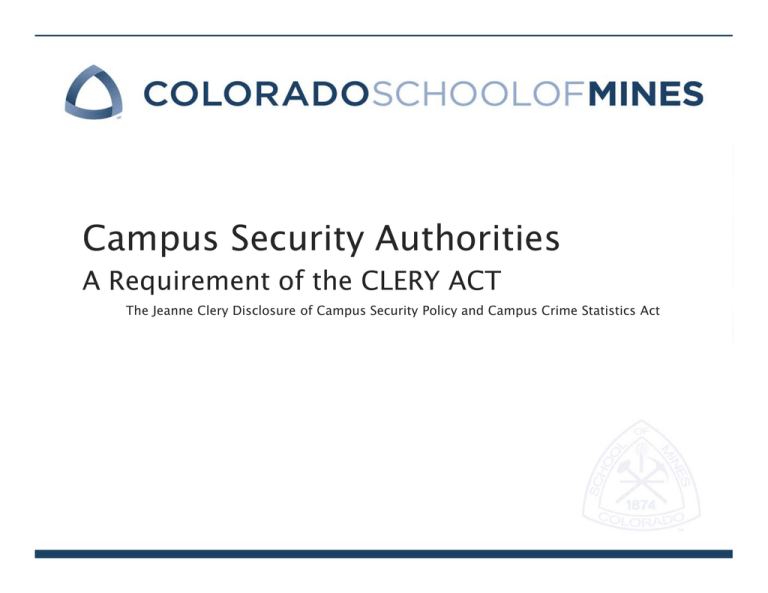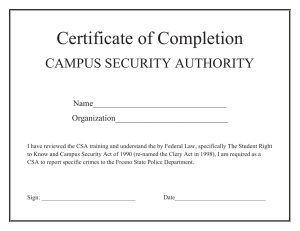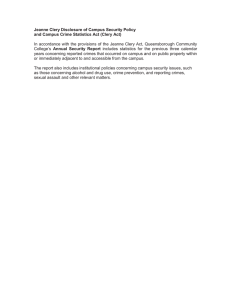
Campus Security Authorities
A Requirement
ofPlanthe CLERY ACT
1. Emergency Management
The Jeanne Clery Disclosure of Campus Security Policy and Campus Crime Statistics Act
INTRODUCTION – The Clery Act
‣ The Clery Act is a federal law requiring all institutions of
higher education that participate in the federal student
financial aid program to disclose information about certain
crime that occurs on and near the campus. It affects nearly
all public and private institutions and is enforced by the U.S.
Department of Education.
‣ Under the Clery Act, the university must collect and disclose
data about the number and types of crimes that occur on
campus.
‣ CSM must publish an Annual Security Report (ASR) including
crime statistics and safety and security policy statements to
students, faculty and staff.
INTRODUCTION – The Clery Act
‣ The reported statistics include:
– The location the crimes occurred (i.e. res halls)
– The types of crimes that were reported
– The year the crimes were reported
– Liquor, drug and weapon violations
‣ Identities of victims or alleged suspects are not
given in Clery Act reports.
‣ Details about Clery Act reporting and what is expected of institutions and
employees can be found in the Handbook for Campus Safety and Security
Reporting, published by the US Department of Education.
The CAMPUS SECURITY AUTHORITY
‣ Campus Security Authority (CSA) is a Clery term
that encompasses groups of individuals and
organizations associated with an institution.
‣ Campus Security Authorities are defined as any
individual who has significant contact with students
or responsibility for student and campus activities
including, but not limited to housing, disciplinary
action, or judicial proceedings.
‣ The Department of Education stresses training of
campus CSA’s.
Who is a CSA
‣ The requirement defines four categories of CSA:
– Campus Police
– Security staff responsible for monitoring university property
– People designated as those to whom crimes may be reported
– Officials with significant responsibility for student and campus
activities (THIS IS THE CATCH ALL PART)
‧ This category includes deans, student housing staff, athletic coaches,
student activities coordinators, student judicial officers, and faculty
advisors to student organizations.
Who is a CSA
The role of CSA is defined by function, NOT by job
title
‣ Campus Security Authority does not apply to:
– Administrative staff not responsible for students
– Clerical staff
– Faculty members who do not serve as an advisor to a registered
organization
– Doctors and counselors who work in a strictly clinical role and
are not involved in student activities
REMEMBER
‣ A CSA is anyone who has significant contact with
students or responsibility for student and campus
activities.
‣ Any faculty or staff member who is an advisor to a
student union, student group, student club or any
other student organization is automatically a
Campus Security Authority.
‣ Any faculty or staff member who has a participatory
role in the disciplinary process of a student is
automatically a Campus Security Authority.
EXAMPLES
‣ Individuals who meet the criteria for being a CSA:
– A Dean of Students
– Student housing or student extracurricular activities staff.
– A Director of Athletics and team coaches
– Employees / Staff who monitor access = Recreation Center Staff
– A Faculty Advisor to a Student Group
– Coordinator of Greek Affairs
– Public Safety / Police Department
‣ If someone has significant responsibility for student and
campus activity, they are a Campus Security Authority
WHY A CAMPUS SECURITY AUTHORITY
‣ The Department of Education recognizes that not
everyone wants to report crimes to campus or local
law enforcement.
‣ They tend to feel more comfortable confiding in
their Club Advisor, Coach, Counselor or their Dean,
or the Human Resource Services Office, among
others.
‣ Offenses reported to those persons are required by
Federal Law to be counted in our Annual Security
Report.
WHAT DOES A CAMPUS SECURITY AUTHORITY DO
‣ The function of a CSA is to report to the official or
office designated by the institution to collect
crime report information (Public Safety and/or
Student Life) those allegations of Clery Act crimes
that you conclude were made in good faith.
Reporting as a CSA
‣ As a designated CSA, if someone tells you about
an incident that may be a crime, you must record
that information and submit a report. The crimes
you report are collected in a database and
statistics are made publically available for student
awareness.
‣ No individual information or names are published.
‣ There is a Clery Act reporting form available from
Public Safety and online. Use the form to report
any incident.
Reporting as a CSA
‣ Victims can report crimes confidentially to a CSA, to be included in
crime statistics without giving a name or initiating criminal
investigation. The decision isn’t yours; a student who talks to you
may not want to talk to the police, and does not have to. CSA
cannot keep confidential from reporting. Note in your report if the
student wants to remain confidential.
‣ As you get the information, focus on getting the facts. The police
will do the analysis. Even an incomplete report can help. Police will
categorize the report; your job is to get the information the
student is willing to tell you.
‣ Remember: You are not a detective. You do not have to prove what
happened or who was at fault, or classify the crime.
WHAT SHOULDN’T A CAMPUS SECURITY AUTHORITY DO
‣ A CSA is NOT responsible for determining
authoritatively whether a crime took place.
‣ That is the function of law enforcement personnel.
‣ A CSA should try NOT to apprehend the alleged
perpetrator of the crime. That too is the
responsibility of law enforcement.
‣ It is NOT the CSA’s responsibility to try and
convince a victim to contact law enforcement if the
victim chooses not to do so.
Questions to Ask
‣ When collecting information for a report, be sure to ask the
following questions:
‣ Is a violent crime in progress? If so call 911 immediately
‣ Does the victim need medical assistance? If so call 911
‣ Has the victim sought or is the victim in need of
assistance/services?
‣ What happened? How, when, and where did it happen? Is
there an identified suspect? Has the incident been reported
to police or another CSA?
‣ Does the victim wish to report confidentially?
Hate Crimes
‣ Hate crimes are crimes that target members of a certain
racial, ethnic, religious or other group and are motivated by
hate. Report any vandalism to the property of a religious,
ethnic, or LGBT organization as a hate crime, even if you are
not sure that a hate crime was involved.
‣ In cases of possible or suspected hate crimes, ask the
previous questions and:
– Was the target personal property, a personal residence, house of worship,
or ethnic organization?
– Did the incident involve any expression of hatred (such as graffiti or
comments) regarding race, gender, gender identity, religion, sexual
orientation, ethnicity, national origin, and disability?
– Did any personal injury result from the incident?
Describe Options
‣ If a student reports a crime to you, let the student
know about options for reporting to police.
Whether or not the student chooses to be named
in the report, do refer the student to campus and
other resources, including:
– Available medical treatment
– Campus resources for sexual assault and other crimes
– Counseling and psychological services
– Dean of Students
What to Report
‣ You can report any crime,
BUT - Crimes that MUST be
reported include:
Criminal homicide; Murder and
non-negligent manslaughter; and
Negligent manslaughter
Sexual Assault: Rape; Fondling;
Incest; Statutory Rape
Domestic Violence / Dating
Violence / Stalking
Robbery
Aggravated Assault
Burglary
Motor Vehicle Theft
Arson
Hate Crimes
If you become aware of liquor,
drug or weapons violations, you
MUST report those as well.
Report crime attempts as well as
crimes that are completed.
You may not be sure that what
is being told to you qualifies as
a crime. Even if you have
doubts, you should file a report.
What to Report: Location
‣ A crime must be reported if it occurred on campus or in oncampus student residences (even if privately owned and
operated).
‣ Crimes must also be reported if they take place on public
property adjacent to campus, or in off-campus locations
deemed closely related to the university. These off-campus
properties are termed “non-campus property”, defined by
law to include:
– Property owned or controlled by the university
– Property owned or controlled by a student organization (e.g. a
fraternity)
– Public property adjacent to campus (e.g. roads and sidewalks)
What to Report: Location
EXCEPTION
‣ When a student or employee reports that they or
someone has been a victim of Sexual Assault,
Dating Violence, Domestic Violence, or Stalking;
‣ Whether the offense occurred on or off campus, it
should be reported.
What to Report
‣ It is not necessary to report a crime that occurred
to a transfer student while studying at another
college. Similarly, you are not required to report
crimes that happened away from campus and
campus activities (such as when the student was
on vacation or working for private company)
‣ Regardless of where a crime takes place, tell the
student about reporting options and refer the
student for help. Not sure, check with Public
Safety.
What to Report: Time
‣ Be sure to document when the crime or incident
occurred and when it was reported to you.
‣ The law requires that the crime be reported for
the calendar year in which it was first reported to
a Campus Security Authority.
‣ Clery Act statistical reports do not include when
the crime occurred, or when it was reported to
police. However, police records will need to have
this information.
What Do I Need To Do
‣ Not a Clery crime - You can report anything to Public Safety at
any time.
‣ Annually Public Safety emails Departments requesting if Clery
crimes were reported during the calendar year, and to provide
that to Public Safety.
‣ If you have a crime to report, you should document as much
information as possible. If you would like to use a crime
report form, Public Safety can provide one.
‣ Even if they wish to remain anonymous and/or do not want
police involvement that is okay, you still need to report the
crime.
Guidelines
‣ Under Clery, a crime is “reported” when it is brought to the
attention of a Campus Security Authority or local law enforcement
personnel by a victim, witness, other third party or even the
offender.
‣ It doesn't matter whether or not the individuals involved in the
crime, or reporting the crime, are associated with the institution.
‣ If a campus security authority receives the crime information and
believes it was provided in good faith, he or she should document it
as a crime report. In “good faith” means there is a reasonable basis
for believing that the information is not simply rumor or hearsay.
‣ You are not responsible for determining whether a crime took
place or to convince a victim to contact law enforcement, but to
document and report to the police.
Summary
‣ A Campus Security Authority (CSA) is anyone who has significant
contact with students or responsibility for student and campus
activities.
‣ As a CSA, you are responsible for reporting crimes that occur on
campus, in public areas surrounding campus, and in university
owned or controlled properties. Statistics for all reported campus
crimes are published annually for the benefit of the campus
community.
‣ Your report should include information of the crime, the time the
crime was reported to you, and the kind of crime that was
committed. As you ask questions and write your report, focus on
collecting as many details as you can, and do your best to describe
them. Interpretation of the report and any investigation that is
needed will be handled by the police.
In Closing
‣ Thank you for your time.
‣ Please contact Public Safety with questions or
concerns 303-273-3333.
‣ Chief of Police Greg Bohlen 303-273-3059
gbohlen@mines.edu


